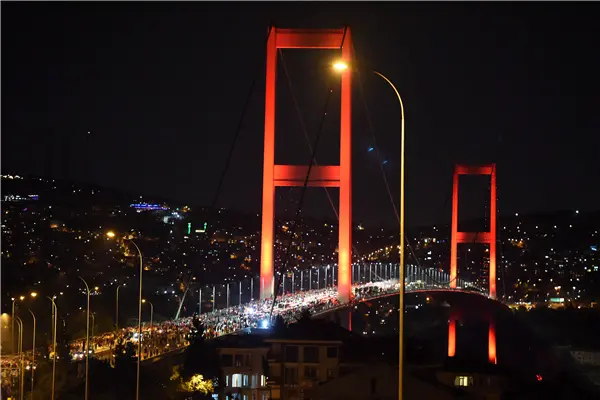Turkey is in the limelight after an unexpected coup attempt and the ensuing crackdown, and for how the country shall move on.
All are pinning their hopes on Turkish President Recep Tayyip Erdogan, the helmsman whose popularity has soared after foiling the coup bid in hours by early Saturday morning, to put the country on the right path.
"Where will Turkey go from here? Well, this is a major watershed event that will change everything," Mustafa Akyol wrote in the Hurriyet daily.
The ongoing crackdown is expanding, implicating tens of thousands from the military, the police, the judiciary, civil service and academia, with the reintroduction of death penalty not ruled out and a state of emergency nationwide declared on Wednesday night.
"The threat of the coup is not over yet, there could be some more sleeping cells within the army," observed Ismail Hakki Pekin, a retired general and former director of the intelligence department of Turkish Joint Chief of Staff.
"We can see the assassins come into play, we can see an increase in bomb attacks and sabotage," he said, adding they may collude with radical Islamist groups in Turkey as well as terror groups like Nusra Front and the Islamic State.
In Akyol's view, the government "certainly has the right to purge and prosecute everybody involved in the plot."
"But there is also a major risk of a huge witch-hunt," the columnist wrote.
The past decade witnessed a once success story in Turkey, made possible with a booming economy, a proactive foreign policy and progress toward the European Union membership, degenerated now into one with frequent terror attacks, rising polarization, deepening diplomatic isolation and a flagging economy, noted Aykan Erdemir, a former member of the Turkish parliament.
"Ankara urgently needs to reverse course," he asserted, calling for "an incrementalist approach to overcome social polarization and political impasse."
Semih Idiz, another columnist, noted that many Turks believe Erdogan has put the interests of the republic aside in favor of the ideological interests of his Islamist party.
"This is what lies at the root of much of the social tension we have," he wrote in Hurriyet. "It will be hard for Turkey to return to even a semblance of normality if he can't make himself the president of the whole nation."
"This coup attempt is ultimately the product of the chaos Turkey has been allowed to drift into," he added, urging Erdogan to help promote the unavoidable debate about who is responsible for the chaos.
The columnist warned of another coup attempt in months or years to come if the president "can't win over his instinct for vengeance."
Erdogan has climbed to "the strongest point" in his political career, "the shape Turkey will take moving forward" depends on how he decides to use it, said Mehmet Yilmaz, another columnist.
"It would be good for the future of our country and our democracy if the wise people within the Justice and Development Party who we hope exist assist him in his decision," he wrote.
Berat Bekir Ozipek, a scholar from Medipol University, said he expected the president to adopt more comprehensive policies in addressing the problems facing Kurds and other minorities in the country.
Cuneyt Akalin, a scholar from Arel University, called for a new approach to foreign relations as he saw a "new horizon" for Turkey.
He referred to the fact that many in Turkey has realized the strategic partnership with the United States is against the country and that Turkey's relationship with the EU is also weakening.
Pekin echoed this sentiment and urged a new approach as well, saying that the U.S. and Turkish interests "do not fit each other, " and Ankara needs neither the NATO nor EU.
Ozipek, referring to lingering doubts in Turkey about the U.S. role in the coup attempt, spoke of a short-term negative impact on ties between the NATO allies.
"But I do not expect a U-turn in the long run," he added.
(APD)
 简体中文
简体中文

